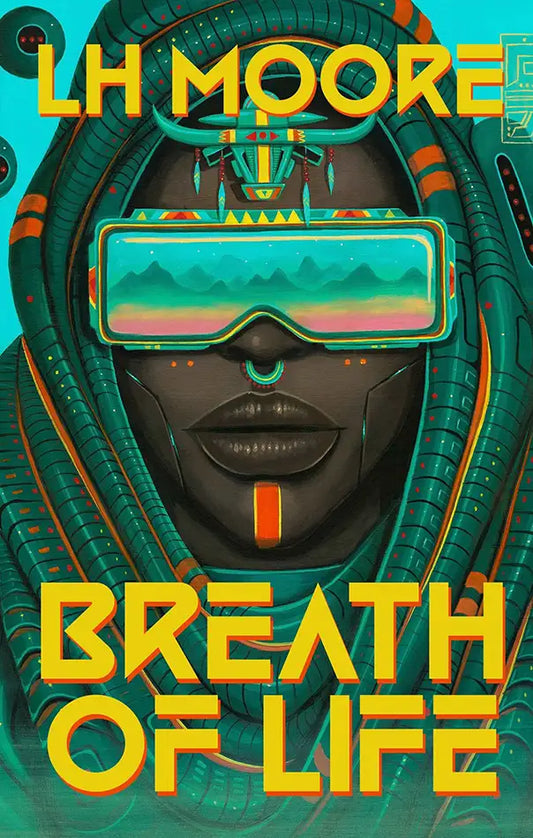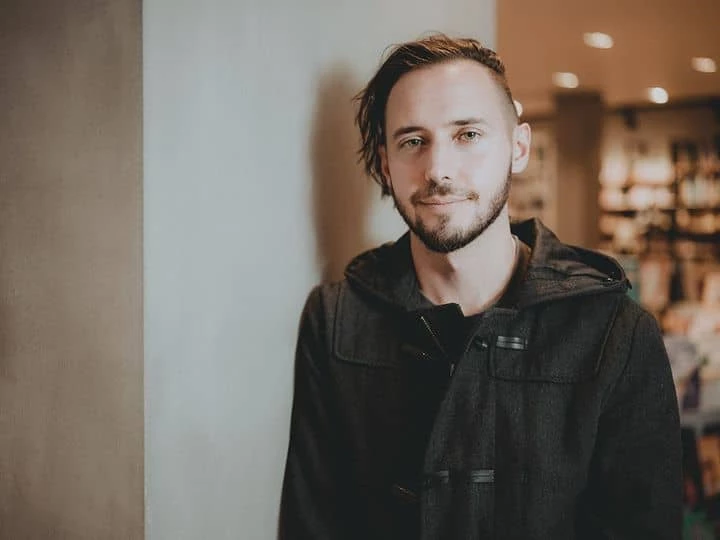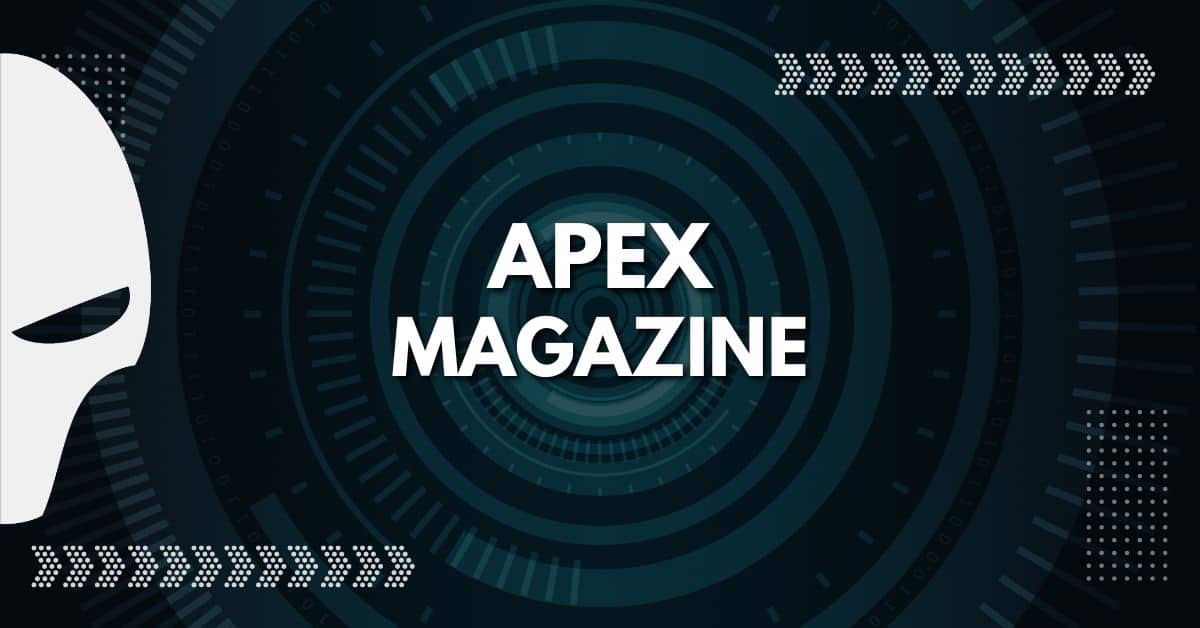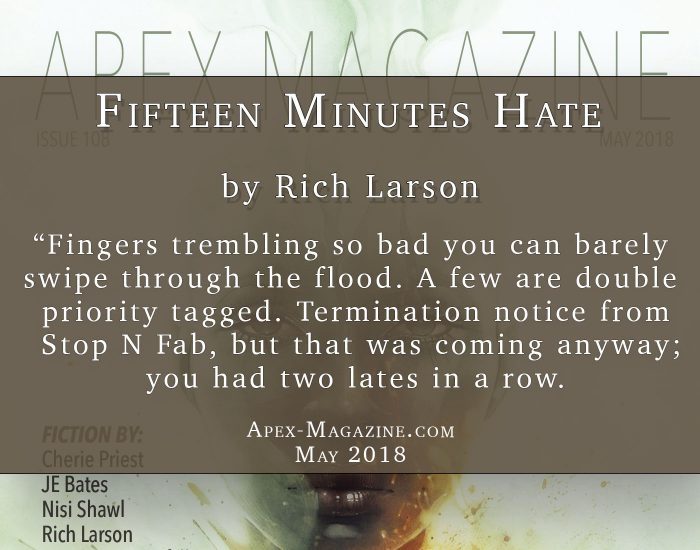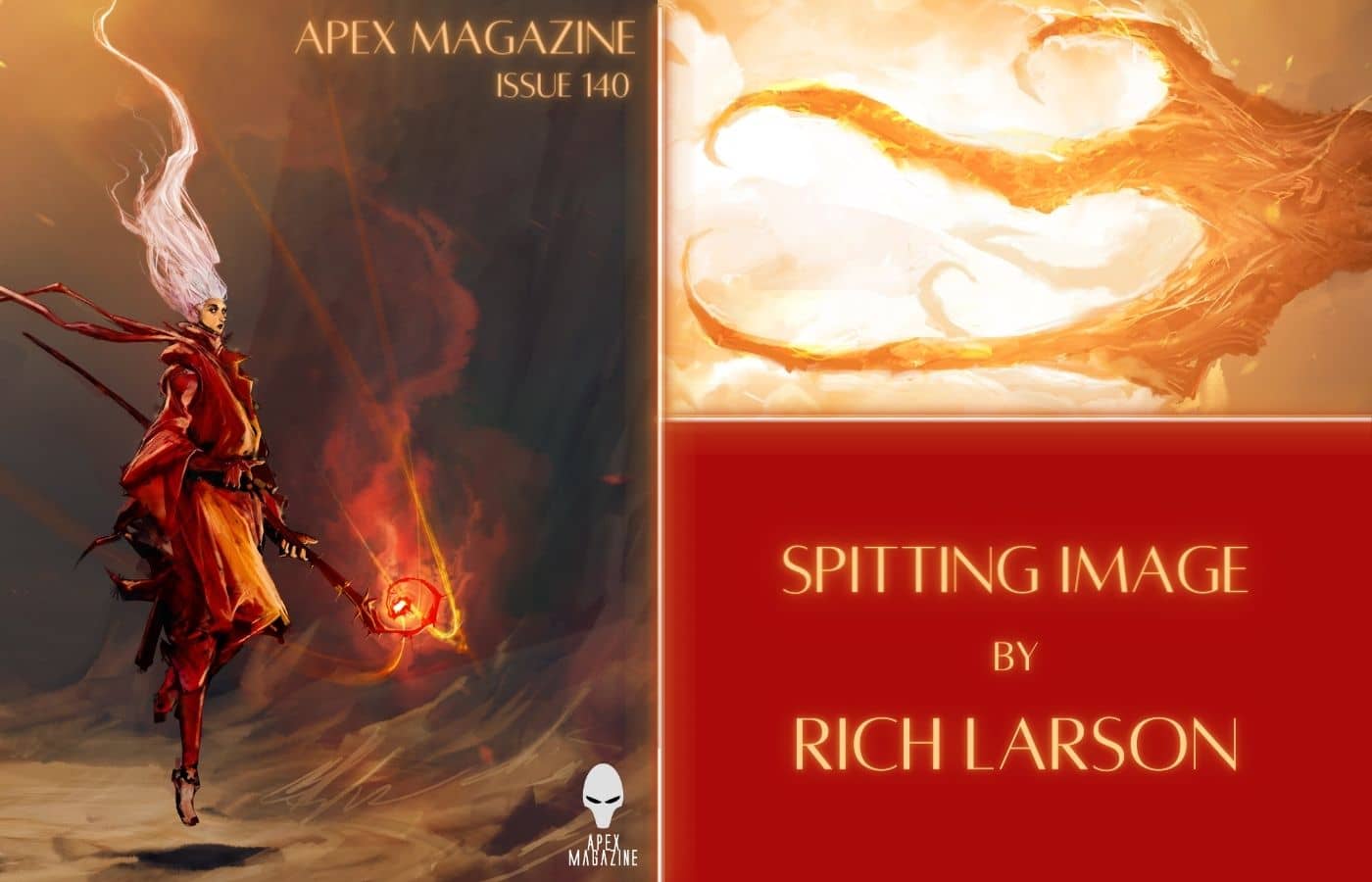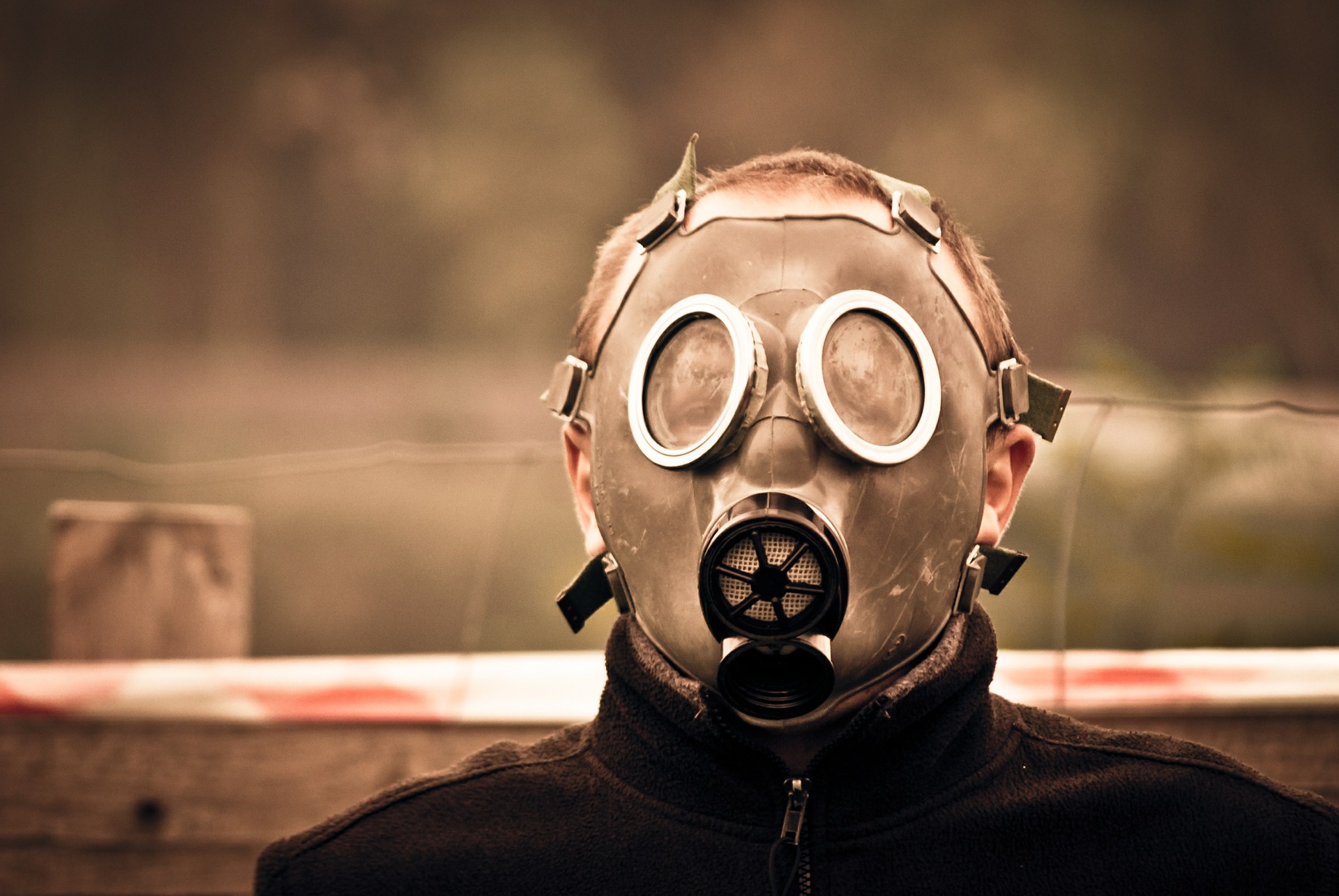
The summer sky was stacking dark clouds when Pau trudged up from the concrete gullet of the parkade. Sweat stuck his shirt to the small of his back and the biolocked handle of his Ceylan Industries suitcase was slippery. Looking over the shrunken brown swatches of lawn and the acid-yellow waterstat holos glowering from apartment windows, he hoped, fervently, that the rain would fall. Maria’s football had been postponed for fear of tearing up the desiccated fields, his wife was desperate to see signs of life in their planter, and he had barely slept all week from the heat.
The heat, and from the project, too. Lying in bed with his feet tingling and itching against his sheets, Brigid’s arm across him like a smoldering log, the fan perched in the window whirring and whirring but never chasing enough cool air into the room, Pau could think of nothing but the project. Anytime he closed his eyes, he saw a thicket of diagrams and tweaks to the equations. He was thinking about it now, replaying the day’s work as he walked towards the apartment’s back entrance.
There was a humming black cab in the lot, empty, but with a soft orange light to indicate it was waiting for its passenger. As he walked past it he felt cold prickling at his neck, maybe the static of the coming storm, maybe something else. He lengthened his stride just as a figure dressed in gray coveralls stepped from behind the rust-pitted recycler unit and into his path.
Above the zippered neck of the coveralls, a bug-eyed gas mask. Pau felt fresh sweat pour out of him, smelled it sharp and sour, and he threw his suitcase to the tarmac, but the figure in the mask ignored it, stepped over it and raised an arm. Pau saw the black gleam of the canister at the same instant the gas hissed across his face.
“Get into the cab.”
Pau had never been dosed with chempliance before, but he’d read the symptoms. Fizzing warm bubbles moving slowly from his feet to his head. A numb smile tugging his mouth apart. The good ache in his chest that assured him the person in the coveralls would never harm him, that made the sonically-distorted voice and extended arm seem so familiar as if it were his oldest friend asking him to climb inside.
Raindrops started to fall, splattering his forehead, and in a tiny part of his brain he wondered if it could rinse the chempliance out of his membranes. But then he was folding himself into the passenger seat of the cab and then they were driving away as the clouds split open and drenched the city.
§
Pau came awake from a dream of chasing Maria and her older sister Naza through the technicolor playground of his childhood school, crawling through pockmarked plastic tunnels, Brigid laughing from somewhere outside. He always dreamt his family whole. When he woke up, it never was, and this time something else was wrong, too.
Dust and darkness too thick for his apartment. He groped for the cool plaster of his bedroom wall and found resin insulation instead. An unfamiliar cot creaked under his spine. Fragments of memory swam up through his aching head. The parking lot. The man in the gray coveralls. The gas. Pau drew a deep breath, inhaling the smell of dust and cleaning chemicals. Panic came for him but he battered it back down and focused on the facts.
He was not a wealthy man, but his suitcase was emblazoned with Ceylan Industries’ sleek orange logo and corporate kidnappings were not unheard of. They had to know he was involved with a classified project. Some rival conglom had kidnapped him for interrogation. They had no reason to touch his family, to take Maria and Brigid.
The conclusion was a relief, but a different, slicker sort of fear trailed after it. He could tell them nothing about the project even if he wanted to. Ceylan had locked his brain as effectively as they had sealed his suitcase. Getting anywhere near the subject triggered a tic in his Broca’s area and turned his words to gibberish.
But a powerful conglom would have countermeasures to bypass words entirely. The image of a faceless interrogator peeling back his scalp and drilling electrode needles through his skull drove him up off the cot. His steps were unsteady from the dregs of whatever had put him under after the chempliance. He staggered a small circle, hands to the walls, feeling the same hard, porous insulation—no, not insulation, soundproofing—on every inch of it.
He found a crack that had to be the door, and a scrabbling minute later, he found a heavy metal lock. He was trying to understand it with his fingertips when the door rattled open. Bright, white light speared him through the eyes and he flinched backward even though he knew he needed to go the other way, needed to push past the blurred silhouette and escape.
Gas hissed across his face.
“Don’t move,” his captor said through the voice modulator, so comforting again, so familiar. Pau squatted there as the door clanked shut. The man in the coveralls held the taped-up flashlight in one hand and with the other dropped a grocery bag on the cot, removing protein bars and a two-liter bottle of water. He set a toy plastic bucket in the corner.
The chempliance dose was weaker this time, and Pau could form words through his numb smile. “What do you want?” he slurred.
His captor didn’t respond, popping open a tube of air freshener to put beside the bucket.
“I can crack the suitcase for you,” Pau mumbled.
No reply. His captor gathered the empty bag and stuffed it into the coveralls’ front pocket in two tries. An overwhelming feeling of familiarity hit Pau again. The chempliance, rooting through his brain and making him think he was among friends.
“Please. My family is okay?”
His captor finally paused. The bulbous mask turned toward him, then bobbed as the man nodded his head. “They’re safe. This is all temporary.”
He hauled the door up high enough to scuttle under, then closed it, sealing Pau back into the dark. Pau crouched where he was, muscles burning in his haunches, his lower back, until the chempliance released him and he could collapse onto the cot.
§
But the man in the gray coveralls had lied. Pau felt it in the itch of his growing beard and the greasiness of his hair as hours in the dark became days. Keeping precise time was impossible: His head was a fog. Often, he was only half-conscious, lying on the cot and imagining himself in the cool climate-controlled labs at Ceylan. Other times he imagined Brigid or Maria or even Naza was there with him. Brigid and Maria asked why he was here and not home. Naza never spoke, and in the dream haze he knew it was because she was dead and not permitted. But the years before her death had been silent, too.
The man in the gray coveralls would come every so often to bring new food and water and to empty the bucket, and like Naza, he never spoke. Pau’s fingertips found small holes poked in the caps of the water bottles, proof that he was being kept drugged. He dumped a day’s worth out onto the floor and watched the puddle spread across the concrete floor and slowly dry. As his thirst grew, his head sharpened. The next time his captor appeared, Pau recited what he’d practiced to the wall.
“They did my Broca’s area,” he said. “Playing a waiting game does you no good. I can’t tell you anything.”
The man picked up the stinking bucket, shining his flashlight down into Pau’s dark yellow piss. “You don’t want to get dehydrated in here.”
“You said this was temporary,” Pau countered, then, trying and failing to keep the anguish out of his voice: “Does my family know I’m alive?”
The bucket clattered, splashing its contents across the man’s boots; his distorter turned exasperation into a rush of static. He bent to wipe up the mess. “They know,” he muttered.
“What do you want?” Pau pushed again. “Isn’t this about …” He fought through slip-sliding words, feeling his tongue turn thick and clumsy in his mouth. “My work?”
His captor straightened abruptly. Nodded. Pau felt a strange dart of pride at the confirmation—too many of the Ceylan higher-ups had deemed the project a funding sinkhole in the past year, but someone else, maybe Juarez or BaruCorp, had seen its potential.
The man in the gray coveralls bundled up his things and picked up his flashlight. The tape was fraying off its handle.
“I would like to know the date,” Pau said. “My daughter’s birthday is soon.”
His captor wrapped the tape back around the flashlight handle, but Pau caught a glimpse of a sleek orange logo before he did. It iced his veins over.
§
Pau had lied. It wasn’t a birthday soon, it was Naza’s death day, and the thought of Brigid taking Maria to the mausoleum alone made him determined to not touch the water, even as his mouth turned mummified dry and his lips cracked. It would be four years, soon, since Naza had fallen off the end of the world. That was the name students had given a rocky overhang that jutted out above the bone-dry Corona riverbed.
At first Pau had wanted to blame her friends, the sullen girl and nervous boy who were always with her, who had been there that night, smoking cigarettes and dangling their legs over the edge. But he knew Naza, who was more like his young self than anyone else, would have been the one to suggest it in the first place. So, he began to blame himself instead, for making his daughter too much like him, not enough like Maria, who was so fierce in football but shied away from anything riskier.
Ceylan Industries had given Pau a way to punish himself: a thankless project, fumbling in the dark, using physics they barely understood to tease out wildly inconsistent results, a tiny ember of hope that burned out time and time again. Kronos, was the name of the project. Kronos had consumed him for the past four years, much how the project’s mythological namesake had consumed his children. But slowly, they had made progress.
And now he was being held captive by a stranger who used a Ceylan flashlight, the kind that had been dumped on his team as part of a morale-boosting package a year ago. A stranger who was so oddly familiar, even with every inch of skin concealed and his voice fed through a distorter. A stranger who had folded a paper towel into thirds to wipe piss off the floor. The jerky movements, almost mechanical, maybe trying to disguise a familiar body language.
The suspicion dug its tendrils in and bloomed. Pau felt his heart quicken, felt sweat crawl down his arms. He was hyperventilating in the dark, staring straight ahead. A muscle jumped in his hand. The idea of it was insane. That was why he hadn’t seen it before. He had no enemies in the team or in the conglom. There was nobody who would benefit from removing him. Not yet, in any case.
With a sudden energy, he circled the storage unit again, thumping his hands against the soundproofing. It was hard and porous, like the bleached white coral he had once taken Naza and Maria to the beach to see. His fingernails scrabbled uselessly against it. Pau seized the fresh bottle of water from the floor. Ignoring his renewed thirst, he poured it carefully over the soundproofing that coated the door.
At first it ran off, wasted, but as he drizzled it more slowly, it began to absorb into the soundproofing, softening it. Pau kept at it for as long as he could stand, then let himself drink the tiny mouthful left in the bottom of the bottle. If it was drugged, it wasn’t enough to dull his new resolve. He dug his fingernails into the soundproofing and started peeling it away in miniscule strips.
Impossible to know how long it took; Pau was not himself. He was in a frenzy. If his suspicion was true, if the masked man was someone he knew well, then the laws of the universe had been shattered. In a way, he had shattered them. Old equations and models flew behind his eyes as he scraped and clawed. Blood squelched underneath his torn thumbnail. The tendons of his hands ached.
Finally, there was a fist-sized hole in the soundproofing, the rusted metal of the storage unit door peeking through. He cast around for anything hard he could use on it, anything that would clang and reverberate. On the third try he managed to pop a metal leg free from its socket on the low cot. Breathing hard, he returned to the hole he’d made, holding the metal leg like a javelin.
Impossible to know the time, to know if the storage facility would be empty or inhabited, to know if his captor was returning soon or never. He jabbed the metal leg against the storage room door. The sound was tinny, vanishingly small. Barely an echo. Pau set his teeth. He drew back and struck again, and again, working himself into a rhythm.
He switched angles, then hands. He shouted until he was hoarse. He didn’t stop, even as his shoulder started to throb, because if he was right then all of the time he had put into the project meant both everything and nothing. Escape was the only way he would find out for certain. Pau pounded at the door and it felt like Naza was standing behind him, waiting for him.
When he finally heard a noise from the other side, he thought he was imagining that, too. He shouted for help again. No response. He curled his aching fingers around the hollow metal bar. If it was his captor, he would fight. Shield his face against the chempliance and swing hard. He readied himself as the storage unit door winched slowly open.
“Do you need assistance?” came a synthesized bleat. “Did you mistakenly lock yourself in?”
He looked down at the wheeled autocleaner and slowly shook his head.
§
Pau staggered out of the storage facility into a hot, dense, moving night. After being cocooned for so long in the quiet dark, it was dizzying. The bright, fluttering holos and halogen glare of streetlamps assaulted his eyes; the cars moved past impossibly fast, trailing the red glow of their taillights behind like blood in the water. His ears were full of the traffic rush and pounding music, hollering voices. He realized it had to be the weekend.
He drifted down the sidewalk until a cab pulled into the curb, its algorithms taking his unsteady walk and unfocused gaze for drunkenness. Pau hesitated, waiting for a faceless man in gray coveralls to emerge, but he was alone. He climbed inside and let the cab bill him by biometric as he clawed open the cooler and uncapped a chilled bottle of water. It stung his desiccated tongue. He made himself drink slowly.
With his free hand, he jabbed at the cab’s onboard screen. It flared to life and Pau’s eyes went to the upper right corner. June 19, 2039. He’d been in that storage unit almost three weeks. His fingernails, backlit by the screen, were long and caked with blood and grime. Tucked in the opposite corner was an emergency pictogram. Pau stared at it. That would be the logical thing to do after escaping a kidnapper. Call emergency services. But the suspicion was growing, pounding inside his skull, and he couldn’t. Not until he was sure.
When the cab stopped at the corner of his street, he got out, still clutching the empty bottle. Water sloshed queasy in his stomach. The cab peeled away and his legs shook as he started up the cracked sidewalk. Insane to even consider it. He searched out his yellow-barred balcony on instinct, seeing the distinct shape of Brigid’s planter clinging to the rail. Too dark to tell if anything was growing. Light leaked from inside the apartment, and voices.
Pau took the stairwell, hauling himself up the rubber-capped steps. The third floor carried a familiar smell of Somalian cooking and marijuana cigarettes. He opened the door and floated down the hallway, his legs moving on automatic toward apartment 314. With every cell in his body, he wanted to dash inside, find Brigid and Maria and hold them tight.
But he made himself wait outside the door to listen. He heard Maria’s high, clear voice and Brigid’s outsized guffawing laugh that had always made Naza join in, too. A beeping microwave. Soft music. He waited, nerves crawling, for a third voice. It didn’t come. Pau put his hand on the knob and let it read his palm-print, then went inside.
Everything was in its place or not-place. The spongy mat shifting colors under his feet, Maria’s shoes kicked haphazardly across the floor vent, the chipped white closet half-open. He slid it the rest of the way, moving automatically to put Maria’s runners away. Inside, he saw a pair of scuffed work shoes, identical to the ones on his feet. A wave of nausea hit him again. He went on tip-toe to reach the top shelf of the closet, feeling past the slippery nylon of umbrellas for the box cutter he kept. His fingers curled around the rough plastic.
“Pau? You left the basket.”
Pau put the box cutter into his pocket and looked up and saw Brigid standing there. She was wearing baggy, gray sweats, watching him quizzically as she tied back her pale blonde hair. Pau felt drunk looking at her. He wanted to touch her lips, feel the shape of her hands enclosed in his.
“The laundry basket,” she said. She frowned. “Your beard. Didn’t you trim it this morning?”
Pau slowly shook his head. He had a brick in the pit of his stomach. He wanted to rage or cry, demand how she could act as if nothing had happened, as if he hadn’t been missing for weeks, but he already knew the reason.
“I’ll go grab the basket,” he said. “Forgot.”
“Are you okay, honey?” Brigid asked, stepping closer. Pau stepped backward in synch. Her nose wrinkled—she must have smelled the stink of the storage unit on him. He wanted to hold her; he wanted to run. He needed time to think.
“I’m fine,” he said. “Forgot.”
He ducked back out the door, shutting it behind him before she could take a closer look at him, see that he was wearing the wrong clothes, that his beard was too long and his skin too sickly sallow. There was a dim roar in his ears as he started back down the hallway.
He was nearly to the stairwell when the door banged open and he came face to face with his well-groomed reflection, holding an empty laundry basket on its hip. The shock on his doppelganger’s features passed quickly, replaced by resignation, guilt, fear. His eyes were pained.
“I didn’t mean for it to go on this long,” his captor said. “I swear.”
“The Kronos project,” Pau said hoarsely, realizing he could speak about it now without seizing up, the same way he could speak about it alone with a mirror. “The quantum slivering. It’s going to work. Unless this is … Unless I’m losing my mind.” He croaked a laugh. “Are we close?”
“You were a few days away from the breakthrough, yes.” His doppelganger glanced nervously up the hallway. “Not here. I’ll explain, but not here.”
Pau stared into his own eyes. Part of his brain was still expecting his movements to be mimicked, for his doppelganger to be only a reflection in unseen glass. Part of his brain was screaming that this was not him, not right, a lie, a trick, a copy. It couldn’t be him because he was him. He wondered if that had made it easier or harder for his doppelganger to drug him and lock him away.
“You used the machine,” Pau said, taking the box cutter from his pocket, sliding the blade out with a soft click. “Show it to me.”
§
They drove with Pau holding the box-cutter to his doppelganger’s neck. It was a singularly strange thing, seeing his own strained face in profile, vanishing and reappearing as they passed under the blurry orange streetlamps, light, dark, light, dark, like a pulse. The car was meant to recognize if a passenger was under duress, but as far as it could tell, Pau was holding the blade to his own sweaty throat.
Maybe he was. Maybe he had wanted so badly for the Kronos project to succeed that he was now acting out some strange delusion. Or maybe he was still captive in the storage unit, hallucinating from a new round of drugs. That would be easier to believe.
They wound through an abandoned residential area, the old, inefficient houses crumbling on dried-up lawns, and Pau suddenly knew where they were going, because he had gone there himself many times, trying to imagine how exactly Naza had fallen. How she had gone from living to dead, vibrant and moving to a splintered body among the rocks.
The car decelerated and came to a graceful halt. Its doors slid open. Pau ushered his doppelganger out, following close behind. The night air was thick and still. The noise of the city was muted. Pau let his doppelganger lead the way into the spindly trees, tramping an overgrown trail lined with crumpled Cruzcampo cans and cigarette butts.
There was a fence blocking the way to the outcrop that jagged out over the riverbed, Naza’s legacy, but Pau could see where the top had been bent inward by climbers and his doppelganger led them through a disguised slit made by wire cutters. Past the edge of the rock, the end of the world, Pau could see the brown trickle of the river far below and the husks of the old industrial sector beyond it, empty smokestacks reaching fingers into the dark sky.
“You know why I had to use it,” his doppelganger said, crouching down to pull brambles away from a concealed shape. “I had to try.”
“I know,” Pau said, because he had always carried the same wild hope in the back of his mind as he toiled over the project. “So why are you here now, and not four years ago?”
His doppelganger hauled the last of the branches away, and Pau saw the machine. It was stripped down, far smaller than he ever could have imagined, dwarfed in size by the hulking prototype in the Ceylan labs. Pau’s breath caught in his chest. His eyes roved over the crisscrossed wiring, the rattling battery, the web of contact points that made up its organic interface. Nothing like the massive portals or sleek vehicles humans had always dreamed of. But it was beautiful.
“Why are you here now?” Pau repeated, dragging his gaze away from it. “We thought there would be no limit to the scope. We thought we could make a sliver predating the machine entirely.”
“That was correct,” his doppelganger said heavily. “I did go back four years. To this spot.”
“And what?” Pau demanded.
His doppelganger grimaced, a muscle jumping in his cheek. “She didn’t fall. She walked off.”
The words hurt, but it was an old hurt, a suture tugged but not tearing. Pau had suspected. Naza’s friends had both said that she slipped. They still said it. But only one had been a good liar. The truth was that Naza had not been their bright, laughing baby for years. She had turned silent, detached. Sometimes very angry. Pau had worried, and Brigid too, but not enough. They had never once imagined she wanted to die.
“Why didn’t you stop her?” Pau asked.
“I stopped her,” the doppelganger said. “The first time. She kept coming back.”
Dread pooled in Pau’s stomach. “What do you mean?”
“I mean I came here four years ago. I waited, in disguise. When she and her friends came, I chased them off.” His doppelganger paused. “I thought I’d done it. Saved her. I knew I couldn’t let you see me. Or him, I guess. The him from four years ago. But I hung around to see Naza alive again.” He stared off the edge. “She snuck out of the house a few days later. I followed her. She went to the overpass, and she jumped before I could do anything.”
The dread was filling Pau’s whole body now, choking his throat. He imagined it: Naza cycling to the overpass, leaning her peeling blue bike against the rail, hopping over the edge as quickly and casually as she would hop off the apartment stoop. Gone.
“So I went back again, with the machine,” his doppelganger said. “A new sliver. I stopped her. Again. But it didn’t matter.” He looked at Pau finally, and his eyes were not wet but they were old, old. “A week, a month, a year. She would always find a way. Even when she was institutionalized. Nobody could stop her.” His doppelganger stared again off the end of the world. “But I came to understand why. It was a causal loop.”
The possibility crystallized in Pau’s mind, fragile but clear. A way out. “If she hadn’t died, I wouldn’t have made the breakthrough on the Kronos Project,” he realized. “Nobody would have. The sliver technology wouldn’t exist.”
“And I could have never gone back to stop her,” his doppelganger said, sounding slightly sick, slightly eager. “Yes. She was balancing an equation. It was compelling her. She couldn’t control it.” He rubbed at his face. “The past can only bend so much before it snaps back into place. We should have never tried. It will drive us all mad. So I came back to sabotage the project. That was my plan. Take your place long enough to terminate the project, then leave. Make a new identity somewhere else.”
“Three weeks,” Pau rasped, remembering the dark, the thirst.
“I never meant it to go on so long,” his doppelganger said. “But each sliver is a one-way door. There is no place with no you. We can’t share one identity. Share Brigid. Share Maria. I always knew I would have to leave. But when I saw them …” His voice gave an anguished twist.
Pau barely registered what he was saying. He was looking at the machine instead. There was a simpler explanation than the causal loop. One that his doppelganger had no doubt considered and rejected, because it was so painful Pau hated himself for thinking it even now. “How many times did she die?” he asked.
“Seven,” his doppelganger said, no hesitation. “Seven times.”
His doppelganger had experienced Naza’s death seven times to his one. Little wonder he had seized on the idea of causality. The idea that the universe was compelling her against her will. But there was another possibility: that she had killed herself because she wanted to. Through whatever crucible of factors, genetic, societal, environmental, Naza had come of age with a small piece of death already inside her. She had been fascinated by the void.
Pau supposed, as his hands began to shake, that the two possibilities were not dissimilar. But there was one key difference. If Naza’s suicide was not threaded into reality, but only into her brain chemistry, it could be prevented. His doppelganger had not been able to keep Naza safe, but Pau knew, with a fierce and sudden certainty, that he could. They were not the same man, after all. Not anymore. Pau would not give up, not after seven times, not after seventy. Even if it meant watching her every second of every day, drugging her asleep, keeping her locked in a padded cell.
He would save her. He would keep her alive, and eventually the darkness would peel away, and she would be the bright, laughing baby he remembered so vividly.
“Don’t,” his doppelganger said, following his gaze to the machine. He sounded immeasurably weary. “You can’t change it.”
Pau’s heart was quickening. “Show me how the machine works,” he said.
“You don’t want to do that,” his doppelganger said. “I’ll leave. The project is terminated. I’ll leave Brigid and Maria to you. I made my choice.”
Brigid and Maria. How many times, alone in the dark, had he longed to see them? How many times had he imagined Brigid’s skin against his skin? How many times had he imagined the sound of Maria’s voice? But he had imagined Naza, too.
“You couldn’t save her.”
Pau couldn’t tell who had said it, if it had rumbled in his chest or out of his doppelganger’s mouth. He crouched down over the machine. He recognized the scaled-down reactors, the organic interface that waited for him like a cilia-ringed mouth.
“Isn’t this what you wanted?” Pau asked. “You’ll have Brigid and Maria. You’ll take my place. And I’ll take yours in the shadows.”
His doppelganger shook his head, but when Pau raised the box cutter, he came over. He keyed a code and the machine hummed. Its status lights switched on, a ghostly yellow in the darkness, illuminating the skeletal trees and cragged rock. His doppelganger’s face looked like a stranger’s.
“Back to that night,” Pau said. Slow and deliberate, he wrapped the cables around himself, letting them take hold like a jellyfish’s tentacles. His doppelganger keyed another code. The hum deepened. Pau looked back towards the cliff one last time before he lay down in the damp earth. He watched as small clods of dirt, patches of the machine, swathes of his own body began to fragment and disappear. If there was pain, it was distant, like a surgical drill. He pictured Naza walking along a narrow ledge with unending blackness on all sides. But he would catch her. He knew he could catch her.
He closed his eyes and let himself be devoured.


